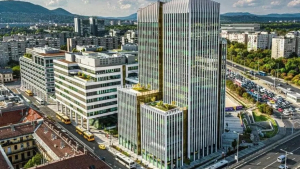
The drop in footfall numbers in the majority of shopping centres combined with a drop in turnover, as well as ongoing talks between tenants and shopping centre owners have caused a slowdown or even temporary suspension of development plans of some retail chains, especially those in the fashion sector. JLL summarised conditions on Poland's retail market at the end of H1 2020.
Traditional shopping on top?
As restrictions in physical stores eased, total retail sales in May were 14.9% higher than in April. At the same time, e-commerce sales dropped from 11.9% in April to 9.1% of total retail sales.
“Although the development of e-commerce in Poland is now very much a fact, traditional retailing is still the most popular choice for Polish customers. The outbreak of the pandemic in March highlighted the challenges that the market, both in Poland and internationally, has been facing for a long time. It is not only about the need to increase the activity of retail chains in e-commerce and omnichannel, but also about seeking out new sales formats and location types that will allow brands to attract new target groups”, comments Anna Wysocka, Head of Retail Agency, JLL.
Supply – developers are diversifying their portfolios
“The outbreak of the pandemic has certainly slowed construction activity. Nevertheless, in H1 2020, developers in Poland completed nearly 148,000 sqm of retail space in largescale projects. Nearly 77,000 sqm of that volume was delivered in Q2 2020. Undoubtedly, one of the highlights not only of this half-year but for the whole of 2020, was the opening of the long-awaited Elektrownia Powiśle in Warsaw”, explains Joanna Tomczyk, Senior Research Analyst, JLL.
At the same time, Sukcesja shopping centre in Łódź and four Tesco stores (in Gorzów Wielkopolski, Piastów, Leszno, and Puławy) were closed.
Currently, the total under-construction volume of retail space to be completed by either 2020 or 2021 totals nearly 490,000 sqm. However, some opening dates may be pushed back.
“An interesting trend, despite the ongoing pandemic, is the continuation of the rapid development of convenience centres. By the end of H1 2020, almost 40,000 sqm in 13 projects entered the Polish market and some 73,000 sqm is still under construction. This proves that smaller centres respond very well to the needs of customers when it comes to convenient and everyday shopping”, adds Joanna Tomczyk.
Demand - some tenants continue to expand
It is not surprising that the pandemic affected the level of demand for retail space. The drop in footfall numbers in the majority of shopping centres combined with a drop in turnover, as well as ongoing talks between tenants and shopping centre owners have caused a slowdown or even temporary suspension of development plans of some retail chains, especially those in the fashion sector.
“It should be noted, however, that some tenants, in particular grocery chain operators and value retailers, such as Tedi, Pepco, Dealz and Action, are still actively looking for new locations. The greatest activity by retailers is being seen in the convenience centre sector, retail parks, outlet centres and shopping centres in smaller cities. In fact, these facilities were the fastest after the lockdown to return to footfall levels similar to pre-pandemic levels”, adds Anna Wysocka.
There is also an uptick in interest in pop-up locations on the Polish market that help tenants to both sell goods that are currently stored in warehouses and test new options.
Retail investment market
“H1’s retail investment volume of €430 million was dominated by the purchase of 61.49% stake in GTC, whose portfolio includes Galeria Jurajska in Częstochowa and Galeria Północna in Warsaw. In addition, Tesco announced the sale of their Polish business to Danish company, the Salling Group which also owns the Netto chain. The transaction, which includes the acquisition of 301 Tesco stores together with distribution centres and the company's headquarters, totalled PLN 900 million. However, the deal is not classified as an investment transaction on the retail market”, comments Andrzej Bzowski, Senior Financial Analyst, JLL.
In addition to the GTC share deal, several smaller transactions were signed in Q2, which involved the following asset classes: convenience, food stores, retail parks and retail schemes for redevelopment.
Prime shopping centre yields are now estimated at 5.15%, with prime retail park yields remaining stable at 6.80%. There was, however, no transactional evidence for shopping centres in Q2 2020, apart from the abovementioned sale of shares in GTC.



